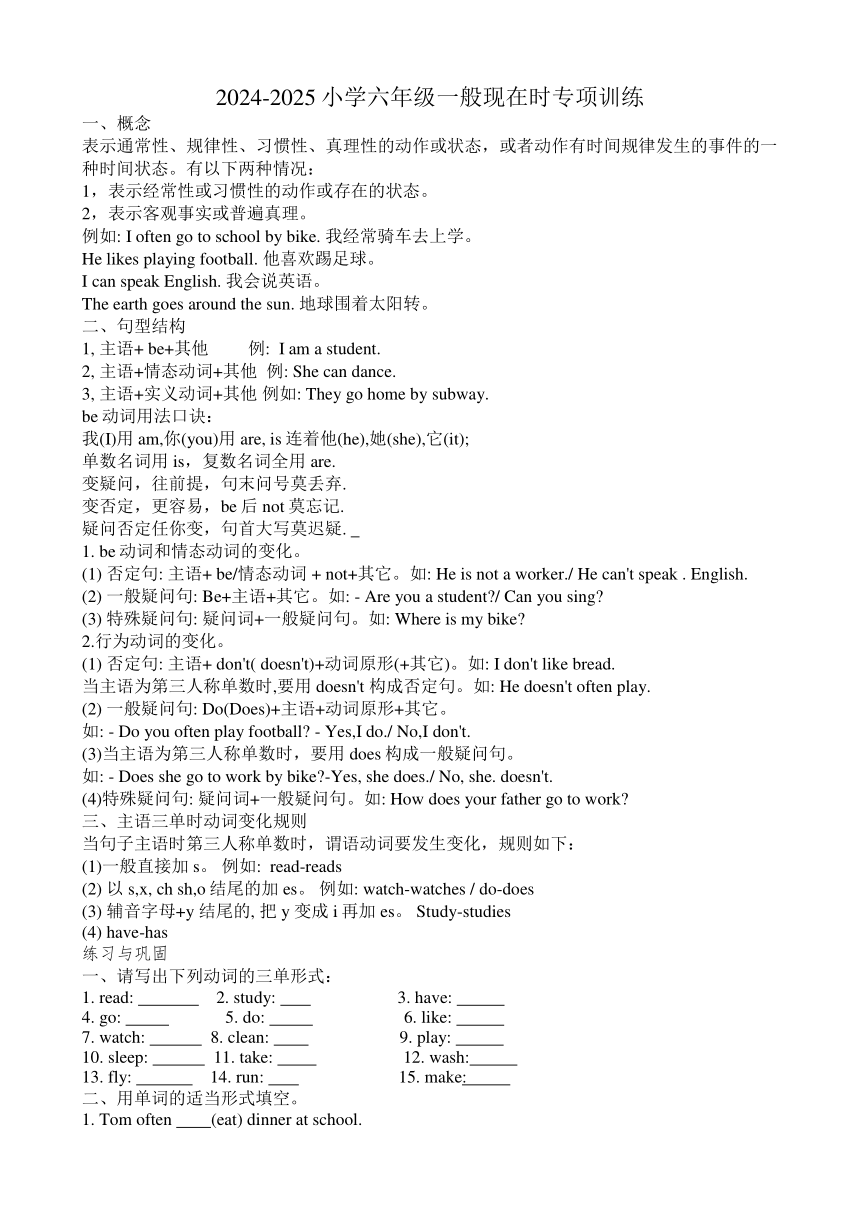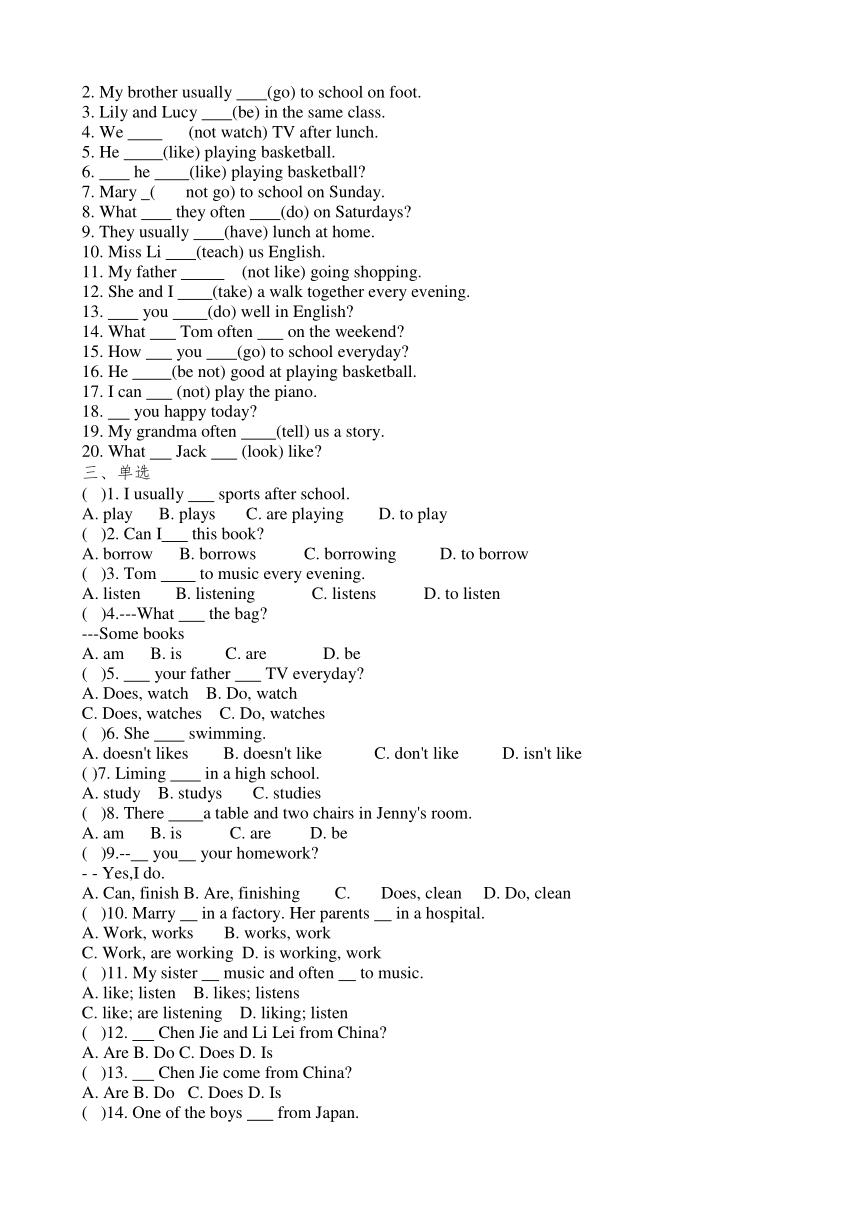人教版(PEP) 2024-2025小学六年级一般现在时专项训练(含答案)
文档属性
| 名称 | 人教版(PEP) 2024-2025小学六年级一般现在时专项训练(含答案) |

|
|
| 格式 | docx | ||
| 文件大小 | 18.9KB | ||
| 资源类型 | 教案 | ||
| 版本资源 | 人教版(PEP) | ||
| 科目 | 英语 | ||
| 更新时间 | 2025-04-11 00:00:00 | ||
图片预览


文档简介
2024-2025小学六年级一般现在时专项训练
一、概念
表示通常性、规律性、习惯性、真理性的动作或状态,或者动作有时间规律发生的事件的一种时间状态。有以下两种情况:
1,表示经常性或习惯性的动作或存在的状态。
2,表示客观事实或普遍真理。
例如: I often go to school by bike. 我经常骑车去上学。
He likes playing football. 他喜欢踢足球。
I can speak English. 我会说英语。
The earth goes around the sun. 地球围着太阳转。
二、句型结构
1, 主语+ be+其他 例: I am a student.
2, 主语+情态动词+其他 例: She can dance.
3, 主语+实义动词+其他 例如: They go home by subway.
be动词用法口诀:
我(I)用 am,你(you)用 are, is连着他(he),她(she),它(it);
单数名词用 is,复数名词全用 are.
变疑问,往前提,句末问号莫丢弃.
变否定,更容易,be后 not莫忘记.
疑问否定任你变,句首大写莫迟疑.
1. be动词和情态动词的变化。
(1) 否定句: 主语+ be/情态动词 + not+其它。如: He is not a worker./ He can't speak . English.
(2) 一般疑问句: Be+主语+其它。如: - Are you a student / Can you sing
(3) 特殊疑问句: 疑问词+一般疑问句。如: Where is my bike
2.行为动词的变化。
(1) 否定句: 主语+ don't( doesn't)+动词原形(+其它)。如: I don't like bread.
当主语为第三人称单数时,要用 doesn't 构成否定句。如: He doesn't often play.
(2) 一般疑问句: Do(Does)+主语+动词原形+其它。
如: - Do you often play football - Yes,I do./ No,I don't.
(3)当主语为第三人称单数时,要用 does构成一般疑问句。
如: - Does she go to work by bike -Yes, she does./ No, she. doesn't.
(4)特殊疑问句: 疑问词+一般疑问句。如: How does your father go to work
三、主语三单时动词变化规则
当句子主语时第三人称单数时,谓语动词要发生变化,规则如下:
(1)一般直接加s。 例如: read-reads
(2) 以s,x, ch sh,o结尾的加 es。 例如: watch-watches / do-does
(3) 辅音字母+y 结尾的, 把y 变成i再加 es。 Study-studies
(4) have-has
练习与巩固
一、请写出下列动词的三单形式:
1. read: 2. study: 3. have:
4. go: 5. do: 6. like:
7. watch: 8. clean: 9. play:
10. sleep: 11. take: 12. wash:
13. fly: 14. run: 15. make:
二、用单词的适当形式填空。
1. Tom often (eat) dinner at school.
2. My brother usually (go) to school on foot.
3. Lily and Lucy (be) in the same class.
4. We (not watch) TV after lunch.
5. He (like) playing basketball.
6. he (like) playing basketball
7. Mary ( not go) to school on Sunday.
8. What they often (do) on Saturdays
9. They usually (have) lunch at home.
10. Miss Li (teach) us English.
11. My father (not like) going shopping.
12. She and I (take) a walk together every evening.
13. you (do) well in English
14. What Tom often on the weekend
15. How you (go) to school everyday
16. He (be not) good at playing basketball.
17. I can (not) play the piano.
18. you happy today
19. My grandma often (tell) us a story.
20. What Jack (look) like
三、单选
( )1. I usually sports after school.
A. play B. plays C. are playing D. to play
( )2. Can I this book
A. borrow B. borrows C. borrowing D. to borrow
( )3. Tom to music every evening.
A. listen B. listening C. listens D. to listen
( )4.---What the bag
---Some books
A. am B. is C. are D. be
( )5. your father TV everyday
A. Does, watch B. Do, watch
C. Does, watches C. Do, watches
( )6. She swimming.
A. doesn't likes B. doesn't like C. don't like D. isn't like
( )7. Liming in a high school.
A. study B. studys C. studies
( )8. There a table and two chairs in Jenny's room.
A. am B. is C. are D. be
( )9.-- you your homework
- - Yes,I do.
A. Can, finish B. Are, finishing C. Does, clean D. Do, clean
( )10. Marry in a factory. Her parents in a hospital.
A. Work, works B. works, work
C. Work, are working D. is working, work
( )11. My sister music and often to music.
A. like; listen B. likes; listens
C. like; are listening D. liking; listen
( )12. Chen Jie and Li Lei from China
A. Are B. Do C. Does D. Is
( )13. Chen Jie come from China
A. Are B. Do C. Does D. Is
( )14. One of the boys from Japan.
A. is B. are C.come D. is come
( )15. My parents always the park after supper.
A. goes B. go C. goes to D. go to
四、按照要求改写句子。
1. Daniel watches TV every evening.(改为否定句和一般疑问句并对划线部分提问)
2. I do my homework every day.(改为否定句和一般疑问句并对划线部分提问)
3. She likes milk.(改为否定句和一般疑问句并对划线部分提问)
4. Amy likes playing computer games.(改为否定句和一般疑问句并对划线部分提问)
5. We go to school every morning.(改为否定句和一般疑问句并对划线部分提问)
6. He speaks English very well.(改为否定句和一般疑问句, 做肯定回答)
7. I like taking photos in the park.(改为否定句和一般疑问句并对划线部分提问)
8. John comes from Canada.(对划线部分提问)
9. She is a good student.(改为否定句和一般疑问句, 作否定回答)
10. Tom often reads books after lunch.(改为否定句和一般疑问句, 作否定回答)
参考答案
1. reads 2. studies 3. has 4. goes 5. does 6. likes 7. watches 8. cleans 9. plays 10. sleeps11. takes 12. washes 13. flies 14. runs 15. makes
二、
1. eats 2. goes 3. are 4. don't, watch 5. likes 6. Does, like 7. doesn't, go 8. do, do 9. have
10. teaches 11. doesn't like 12. take 13. Do, do 14. does, do. 15. do, go 16. isn't 17. not
18. Are 19. tells 20. does, look
三、
1-5. AACBA 6-10. BCBDB 11-15. BACAD
四、
1. Daniel doesn't watch TV every evening.
Does Daniel watch TV every evening
What does Daniel do. every evening
2. I don't do my homework every day.
Do you do your homework every day
What do you do every day
3. She doesn't like milk.
. Does she like milk
What does she like
4. Amy doesn't like playing computer games.
Does Amy like playing computer games
What does Amy like doing
5. We don't go to school every morning.
Do you go to school every morning
What do you do every morning
6. He doesn't speak English very well.
Does he speak English very well
Yes, he does.
7. I don't like taking photos in the park.
Do you like taking photos in the park
What do you like doing in the park
8. Where does John come from
9. She isn't a good student.
Is she a good student
10. Tom doesn't often read books after lunch.
Does Tom often read books after lunch
What does Tom often do after lunch
一、概念
表示通常性、规律性、习惯性、真理性的动作或状态,或者动作有时间规律发生的事件的一种时间状态。有以下两种情况:
1,表示经常性或习惯性的动作或存在的状态。
2,表示客观事实或普遍真理。
例如: I often go to school by bike. 我经常骑车去上学。
He likes playing football. 他喜欢踢足球。
I can speak English. 我会说英语。
The earth goes around the sun. 地球围着太阳转。
二、句型结构
1, 主语+ be+其他 例: I am a student.
2, 主语+情态动词+其他 例: She can dance.
3, 主语+实义动词+其他 例如: They go home by subway.
be动词用法口诀:
我(I)用 am,你(you)用 are, is连着他(he),她(she),它(it);
单数名词用 is,复数名词全用 are.
变疑问,往前提,句末问号莫丢弃.
变否定,更容易,be后 not莫忘记.
疑问否定任你变,句首大写莫迟疑.
1. be动词和情态动词的变化。
(1) 否定句: 主语+ be/情态动词 + not+其它。如: He is not a worker./ He can't speak . English.
(2) 一般疑问句: Be+主语+其它。如: - Are you a student / Can you sing
(3) 特殊疑问句: 疑问词+一般疑问句。如: Where is my bike
2.行为动词的变化。
(1) 否定句: 主语+ don't( doesn't)+动词原形(+其它)。如: I don't like bread.
当主语为第三人称单数时,要用 doesn't 构成否定句。如: He doesn't often play.
(2) 一般疑问句: Do(Does)+主语+动词原形+其它。
如: - Do you often play football - Yes,I do./ No,I don't.
(3)当主语为第三人称单数时,要用 does构成一般疑问句。
如: - Does she go to work by bike -Yes, she does./ No, she. doesn't.
(4)特殊疑问句: 疑问词+一般疑问句。如: How does your father go to work
三、主语三单时动词变化规则
当句子主语时第三人称单数时,谓语动词要发生变化,规则如下:
(1)一般直接加s。 例如: read-reads
(2) 以s,x, ch sh,o结尾的加 es。 例如: watch-watches / do-does
(3) 辅音字母+y 结尾的, 把y 变成i再加 es。 Study-studies
(4) have-has
练习与巩固
一、请写出下列动词的三单形式:
1. read: 2. study: 3. have:
4. go: 5. do: 6. like:
7. watch: 8. clean: 9. play:
10. sleep: 11. take: 12. wash:
13. fly: 14. run: 15. make:
二、用单词的适当形式填空。
1. Tom often (eat) dinner at school.
2. My brother usually (go) to school on foot.
3. Lily and Lucy (be) in the same class.
4. We (not watch) TV after lunch.
5. He (like) playing basketball.
6. he (like) playing basketball
7. Mary ( not go) to school on Sunday.
8. What they often (do) on Saturdays
9. They usually (have) lunch at home.
10. Miss Li (teach) us English.
11. My father (not like) going shopping.
12. She and I (take) a walk together every evening.
13. you (do) well in English
14. What Tom often on the weekend
15. How you (go) to school everyday
16. He (be not) good at playing basketball.
17. I can (not) play the piano.
18. you happy today
19. My grandma often (tell) us a story.
20. What Jack (look) like
三、单选
( )1. I usually sports after school.
A. play B. plays C. are playing D. to play
( )2. Can I this book
A. borrow B. borrows C. borrowing D. to borrow
( )3. Tom to music every evening.
A. listen B. listening C. listens D. to listen
( )4.---What the bag
---Some books
A. am B. is C. are D. be
( )5. your father TV everyday
A. Does, watch B. Do, watch
C. Does, watches C. Do, watches
( )6. She swimming.
A. doesn't likes B. doesn't like C. don't like D. isn't like
( )7. Liming in a high school.
A. study B. studys C. studies
( )8. There a table and two chairs in Jenny's room.
A. am B. is C. are D. be
( )9.-- you your homework
- - Yes,I do.
A. Can, finish B. Are, finishing C. Does, clean D. Do, clean
( )10. Marry in a factory. Her parents in a hospital.
A. Work, works B. works, work
C. Work, are working D. is working, work
( )11. My sister music and often to music.
A. like; listen B. likes; listens
C. like; are listening D. liking; listen
( )12. Chen Jie and Li Lei from China
A. Are B. Do C. Does D. Is
( )13. Chen Jie come from China
A. Are B. Do C. Does D. Is
( )14. One of the boys from Japan.
A. is B. are C.come D. is come
( )15. My parents always the park after supper.
A. goes B. go C. goes to D. go to
四、按照要求改写句子。
1. Daniel watches TV every evening.(改为否定句和一般疑问句并对划线部分提问)
2. I do my homework every day.(改为否定句和一般疑问句并对划线部分提问)
3. She likes milk.(改为否定句和一般疑问句并对划线部分提问)
4. Amy likes playing computer games.(改为否定句和一般疑问句并对划线部分提问)
5. We go to school every morning.(改为否定句和一般疑问句并对划线部分提问)
6. He speaks English very well.(改为否定句和一般疑问句, 做肯定回答)
7. I like taking photos in the park.(改为否定句和一般疑问句并对划线部分提问)
8. John comes from Canada.(对划线部分提问)
9. She is a good student.(改为否定句和一般疑问句, 作否定回答)
10. Tom often reads books after lunch.(改为否定句和一般疑问句, 作否定回答)
参考答案
1. reads 2. studies 3. has 4. goes 5. does 6. likes 7. watches 8. cleans 9. plays 10. sleeps11. takes 12. washes 13. flies 14. runs 15. makes
二、
1. eats 2. goes 3. are 4. don't, watch 5. likes 6. Does, like 7. doesn't, go 8. do, do 9. have
10. teaches 11. doesn't like 12. take 13. Do, do 14. does, do. 15. do, go 16. isn't 17. not
18. Are 19. tells 20. does, look
三、
1-5. AACBA 6-10. BCBDB 11-15. BACAD
四、
1. Daniel doesn't watch TV every evening.
Does Daniel watch TV every evening
What does Daniel do. every evening
2. I don't do my homework every day.
Do you do your homework every day
What do you do every day
3. She doesn't like milk.
. Does she like milk
What does she like
4. Amy doesn't like playing computer games.
Does Amy like playing computer games
What does Amy like doing
5. We don't go to school every morning.
Do you go to school every morning
What do you do every morning
6. He doesn't speak English very well.
Does he speak English very well
Yes, he does.
7. I don't like taking photos in the park.
Do you like taking photos in the park
What do you like doing in the park
8. Where does John come from
9. She isn't a good student.
Is she a good student
10. Tom doesn't often read books after lunch.
Does Tom often read books after lunch
What does Tom often do after lunch
同课章节目录
